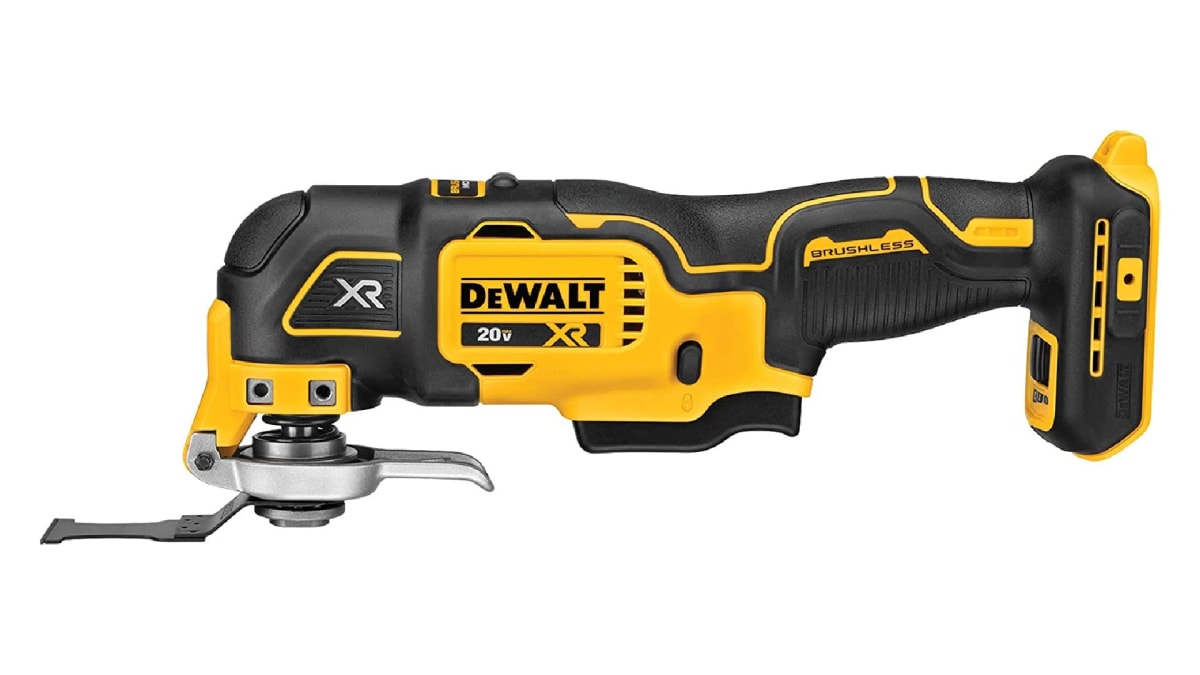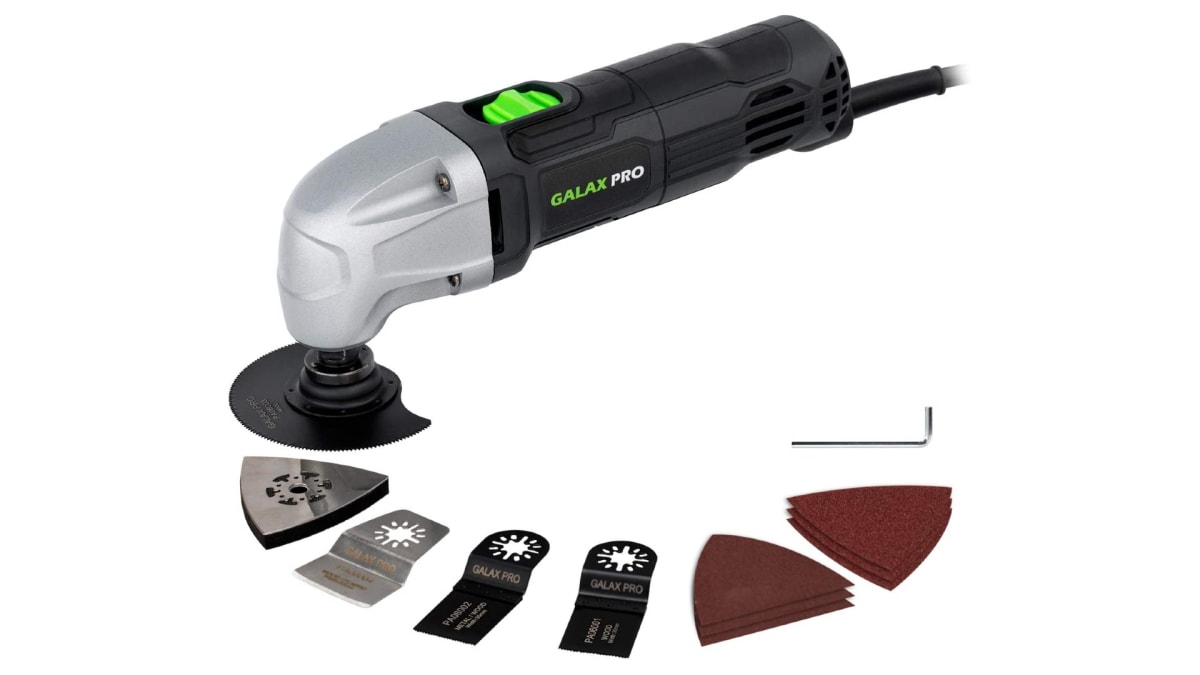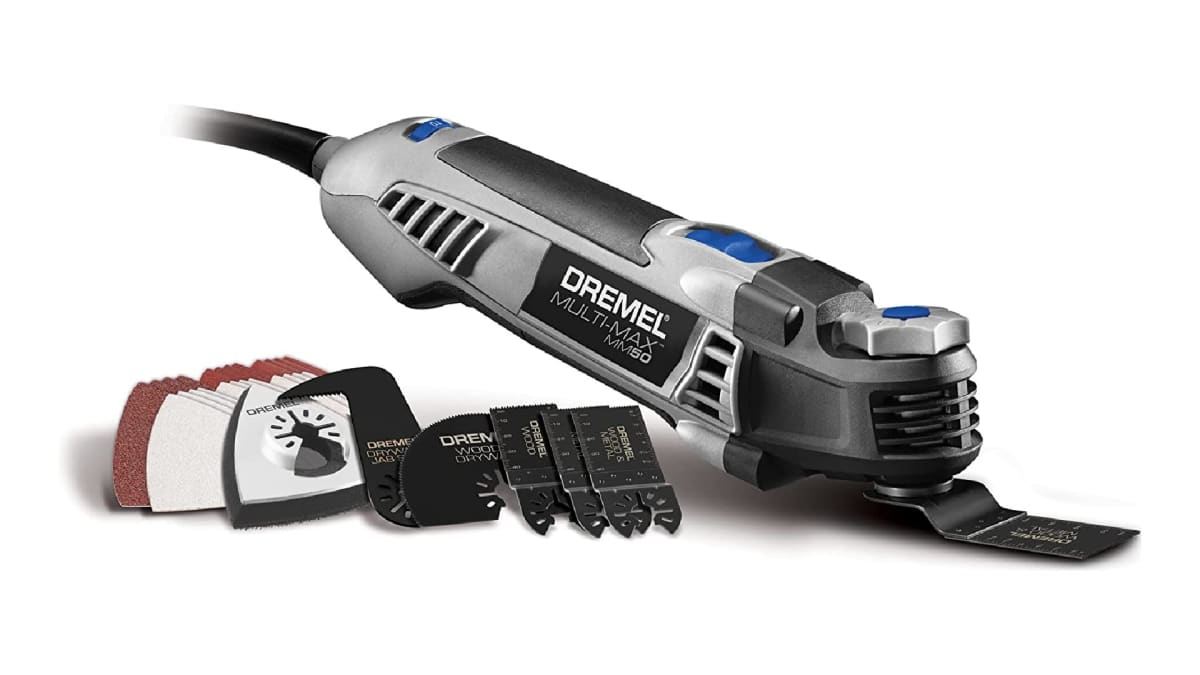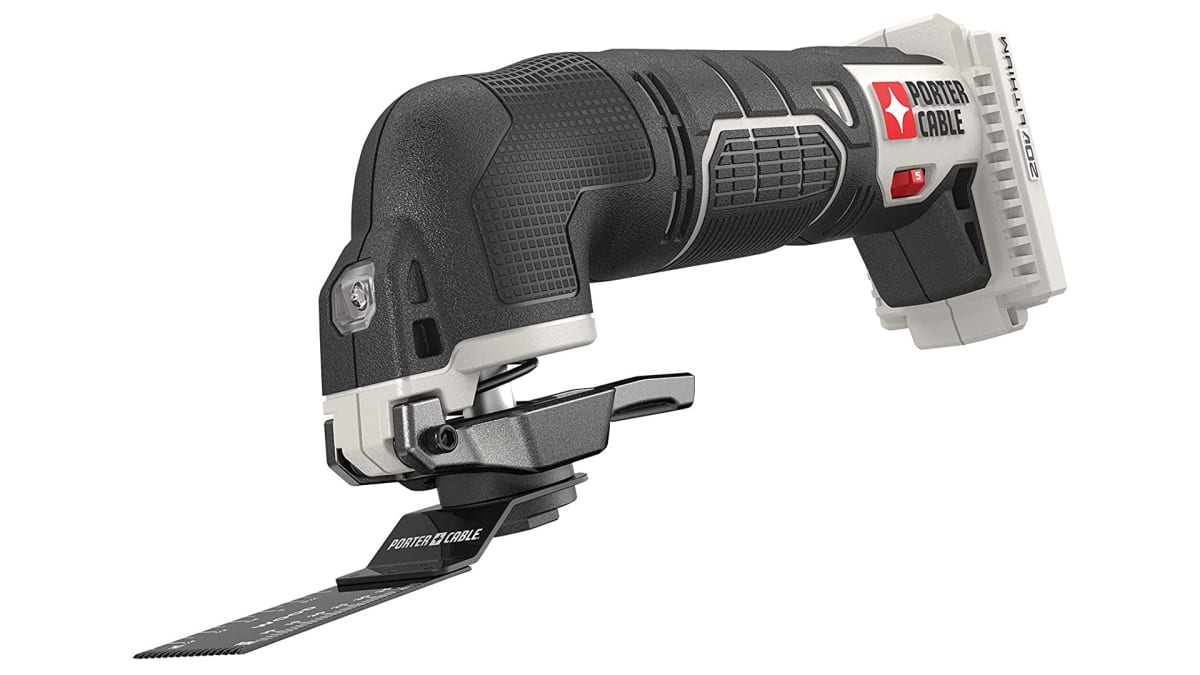Autoblog is not affiliated with the brands featured in our articles, but when you make a purchase through links on our site we may earn a commission.
Oscillating tools can single-handedly fulfill your various cutting and sanding needs. Check out our top oscillating tool picks for 2022. An oscillating tool works with a huge array of accessories to tackle just about any home improvement project you put it to. Whether you’re working with metal or wood, a good oscillating tool will cover all your needs and it’s a worthy addition to any garage.
An oscillating tool can sand, file, cut, scrap, and drill, and their prices are pretty reasonable considering how many tools this single device can replace in your tool collection. The popularity and practicality of oscillating tools have led to a huge number of similar products hitting the market, and when you search for one, you’ll encounter hundreds of options, each claiming to be better than the rest. So, how do you figure out which oscillating tool to purchase? Why, by checking out our recommendations for the finest oscillating tools in 2022, of course. You can also use the included buyer’s guide below to identify the right oscillating tool for your needs.
Here are the top oscillating tools of 2022
DEWALT Max XR Oscillating Multi-Tool: Great pick
The Dewalt Max XR Oscillating Multi-Tool is a popular choice among DIY enthusiasts. It’s a compact and lightweight device, and you can purchase it as a standalone tool or in a kit with three to five different attachments. This oscillating tool features a powerful brushless motor that the manufacturer claims is 57 percent more efficient than a brushed one. It can run at three different speeds, and its dual-grip variable speed trigger gives you better control while using it. This oscillating tool also has an LED light to brighten up any dark areas you may be working in, as well as a universal accessory adapter that works with accessories from many different brands.
Pros
- Easy to use
- Simple accessory switching
- Variable speed option
Cons
- The speed switch is not in an ideal location
GALAX Oscillating Multi-Tool: Budget option
For anyone who wants a quality oscillating tool but can’t — or doesn’t want to — shell out lots of money, the Galax Oscillating Multi-Tool is a solid option. This tool boasts heavy-duty construction with a robust metal gearhead for sturdiness and durability. It has a compact body that weighs in at just over 3 pounds and comes equipped with a 3-foot long power cable for operation. This oscillating tool is fitted with a 1.5-ampere motor that can deliver 22,000 oscillations per minute (OPM). You can use it with the provided accessories to trim, scrape, cut, sand and drill, and its accessory screw is universal, so you can easily pick up additional blades without having to worry about compatibility.
Pros
- Comes complete with accessories
- Vibration control improves accuracy
- Durable and sturdy construction
Cons
- Issues with the On/Off switch
Dremel Multi-Max Oscillating Tool Kit: Great value
The Dremel Multi-Max oscillating tool kit is a great option for buyers who want a high-quality kit without the hassle of having to purchase accessories separately. This kit includes the oscillating tool and 30 different accessories, all of which are designed to serve you in your various DIY projects. This oscillating tool boasts a compact head and angled body, making it easy enough to use, and it’s pretty lightweight to boot. It supports tool-less accessory changes, which can make the entire process a breeze. The oscillating tool’s variable speed control allows it to operate between 10,000 and 21,000 oscillations per minute, letting you optimize its performance and precision according to the material you’re working with.
Pros
- Supports tool-less accessory changes
- Variable speed control for top performance
- Angled design makes it easy to use
Cons
- The blade tends to loosen as you work
PORTER-CABLE Max Oscillating Tool: Recommended
Porter-Cable gives you the option of purchasing this oscillating tool by itself or with various handy accessories included. The accessory-inclusive offering is affordable and comes with lots of useful features, like a variable speed dial, an LED work light, and a two-finger accessory change system. This oscillating tool can operate between 8,000 to 18,000 oscillations per minute, giving you ultimate control over your work. It’s compact and lightweight, and it has an ergonomic shape with a three-position over-mold grip for improved handling. It can also help absorb vibration to deliver precise cuts, so no matter what you’re working on this oscillating tool should be able to help you get the job done the right way.
Pros
- Ergonomic shape improves handling and precision
- Speed adjustment is very easy
- Accessory changes don’t require any tools
Cons
- Adapter required to use other brands’ blades
AVID POWER Oscillating Tool: Good value
If you’re looking for a quality oscillating tool, this Avid Power device should be on your list of options to consider — it’s certainly on ours! This tool is fitted with a 3.5-ampere motor that can deliver oscillating speeds between 15,000 and 22,000 oscillations per minute, and it also has a six-speed switch that will let you set a suitable output speed for whatever it is you’re working on. It features an ergonomic design with an auxiliary handle, making for a convenient and stable grip during use. The tool has a universal fit system that accepts almost all oscillating tool accessories, and it also supports tool-free blade changes for added convenience.
Pros
- Easy-to-use ergonomic design
- Includes 13 accessories and a storage bag
- Works with many different aftermarket accessories
Cons
- Makes a lot of noise
Buyer’s guide for finding an oscillating tool
Oscillating tools are relatively new compared to power drills and circular saws, which is why not everyone might be aware of their true potential. We’ve compiled a buyer’s guide that lists everything you should know to find a great oscillating tool in 2022. Check it out:
What to look for in an oscillating tool
Power source
When they were first introduced, oscillating tools were exclusively corded — you had to keep them hooked up to a power source to use them, but recent advancements in lithium-ion batteries have also made this compact device cordless.
You have the option to purchase either a corded or cordless oscillating tool. Corded models are great for people who use them frequently and for longer durations, while cordless, battery-operated oscillating tools are suitable for sites where cords can be a tripping hazard. You should weigh your needs and usage conditions before choosing the right one for yourself.
Power output
An oscillating tool’s power output is another important thing to consider before finalizing your purchase. If you’re getting the tool for heavy-duty reconstruction or modeling it’s better to get a device with a high 4- to 5-rated amperage, while a 3-ampere model should be good enough for light-duty applications.
Speed
The speed of an oscillating tool determines how effective it is at cutting and sanding. You need a combination of the right blade and speed to get various jobs done — cutting metal requires lower speeds than cutting wood, so getting an oscillating tool with an adjustable range is a smart decision.
Models with speeds ranging from 8,000 to 20,000 oscillations per minute ensure optimal performance for most DIY uses.
Ergonomics
While all oscillating tools are designed with ergonomics in mind, some are still easier to use than others. We’re not just talking about size and weight alone — the mechanism of attaching and replacing blades should also be effortless.
You should prioritize ergonomics both in terms of handling and blade changes. If you can find a model with adjustable blade settings, that’s a huge bonus.
Benefits of having an oscillating tool at home
Oscillating tools are great for both professionals and DIYers. Let’s look at some benefits of having an oscillating tool at home:
- Since this single device can conduct a variety of jobs, an oscillating tool can help you save a lot on otherwise costly tool expenses
- Changing between different attachments is less time-consuming than changing between different tools
- You can choose to purchase a corded model or decide to go cordless with a battery-operated device
- Many oscillating tools are compact, making them easy to use in tight spaces
- Oscillating tools will also take up less space in your tool shed than larger power tools
Types of oscillating tool blades
Rightly called the multi-tool, an oscillating tool can help you drill, sand, grind, cut, polish, edge, trim, scrape, and clean. This is super handy, but all of these functions require you to have the right blades. Let’s look at the different types of oscillating tool blades and their uses:
Fine tooth blades
Available in different sizes, fine tooth blades are used to cut, with measuring strips engraved on them for increased precision. You can use these to cut both wood and metal, but just make sure that the blade mentions the material you want to cut.
Plunge cut blades
Similar to fine tooth blades, a plunge cut blade delivers a wider cut. These are not meant for precision, but they’re useful when you need deep or wide cuts.
Segment saw blades
Segment saw blades are an ideal choice when you want to cut more material in less time. They’re about 3⅛ inches wide and can cut anything from 4×4s to drywall.
Scraper blades
Scraper blades come in handy when you need to remove any old caulk, silicone, adhesive, or other nasty things. When used with an oscillating tool, this blade doesn’t cut, but instead scrapes away whatever you place it on — and pretty quickly too.
Sanding accessories
A great thing about oscillating tools is their ability to double up as a sander. While it may not be useful for heavy-duty sanding jobs, you can use an oscillating tool with sanding attachments and pads for quick sanding purposes. Even better is that it only takes a few seconds to switch from cutting to sanding.
Carbide blades
A carbide blade comes in handy when you’re dealing with tough materials like concrete, brick, or cement, but it can also be useful for lighter jobs like wood-cutting. They’re more expensive than steel blades but they’ll last significantly longer.
Drywall saw blades
Drywall saw blades are specialty accessories designed for the sole purpose of cutting drywall. They come in fine tooth, plunge and segment saw options for an improved drywall cutting experience.
Outlet box cutters
We all understand how tricky it is to cut a hole for an outlet box, but these specialty blades can make the whole process pretty simple. Just pair one with your oscillating tool to make an outlet box in paneling or drywall without measuring or marking. They’re an expensive accessory, but they can save you a lot of time and effort.
Conclusion
An oscillating tool is a versatile piece of equipment that every DIYer should own. It can help you tackle many projects without needing to use any separate tools, and all you’ll need are a few attachments. We’ve rounded up the leading oscillating tools in 2022, and each of these is a high-quality product designed to make working on your projects easier. You can use the included buyer’s guide to pick up hints and pointers to choose the right oscillating tool for yourself.
Oscillating Tool FAQs
Q: Is an oscillating multi-tool a worthy purchase?
Yes, an oscillating tool is a worthy purchase for anyone interested in DIY projects. When used with the right accessories, even the lowest quality device can cut, sand, grind, polish, or carve much better than other tools.
Q: What’s the difference between oscillating and rotary tools?
An oscillating tool is a multi-function device that can sand, cut, carve, polish, sculpt, scrape and grind almost any material when fitted with the right bits. A rotary tool, on the other hand, is designed for modifying or detailing purposes, and in the hands of a skilled person, it can work wonders with its sculpting potential.
Q: Do all oscillating tools use the same blades?
No, not all oscillating tools use the same blades. They come in various sizes and configurations, so you have to be careful about choosing the ones that are compatible with your tool.
Source: www.autoblog.com





